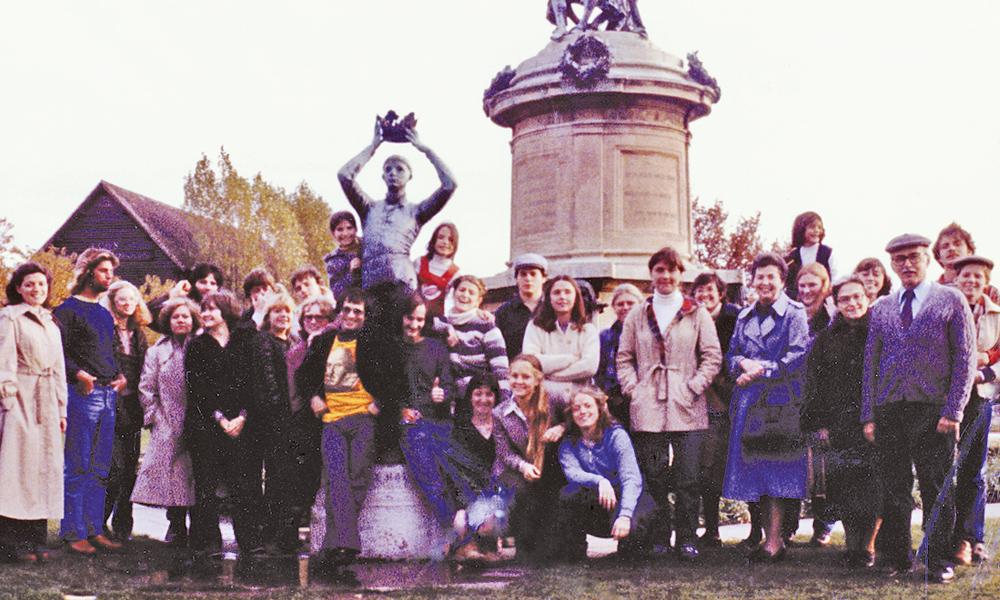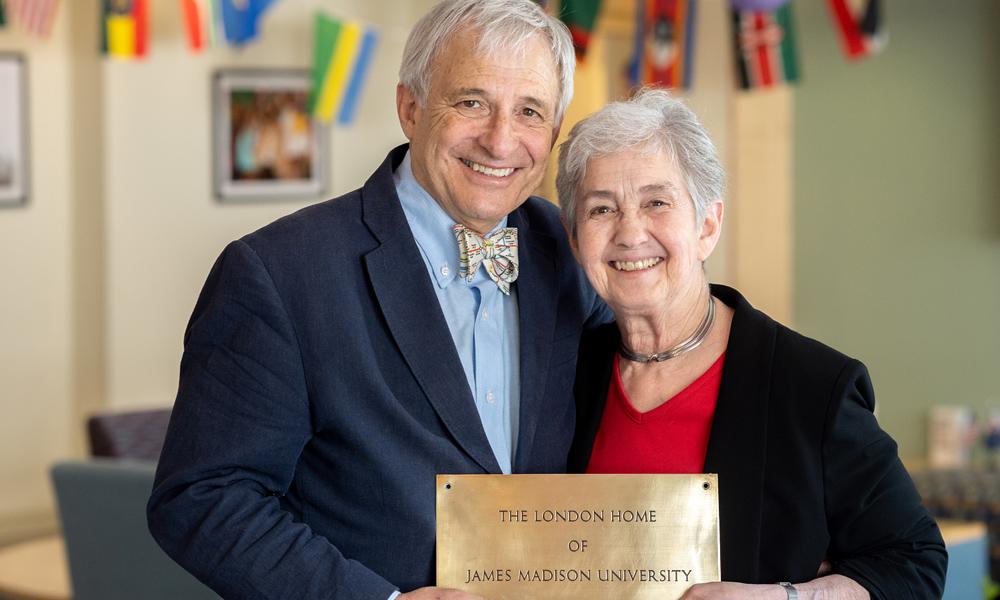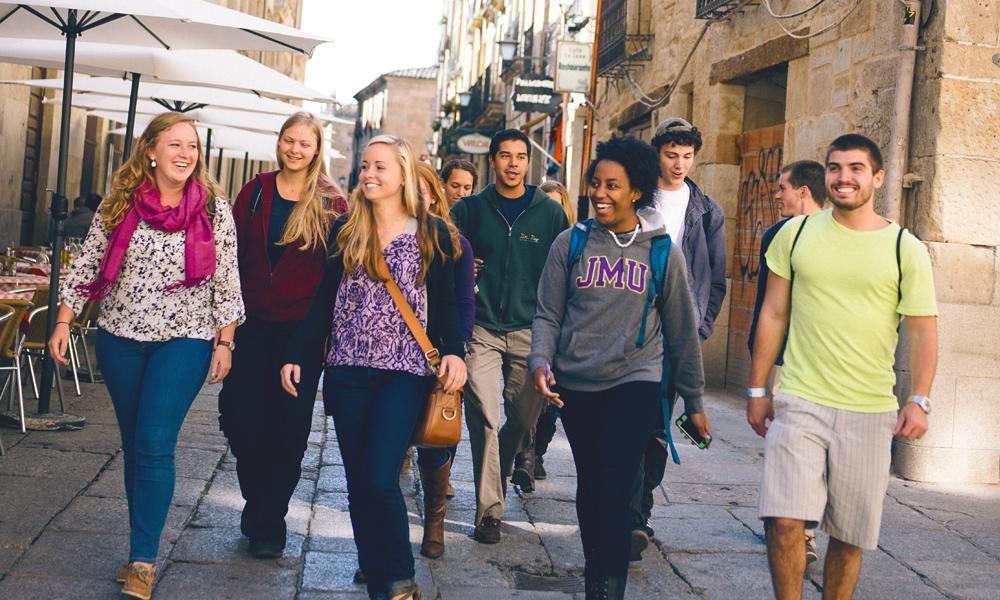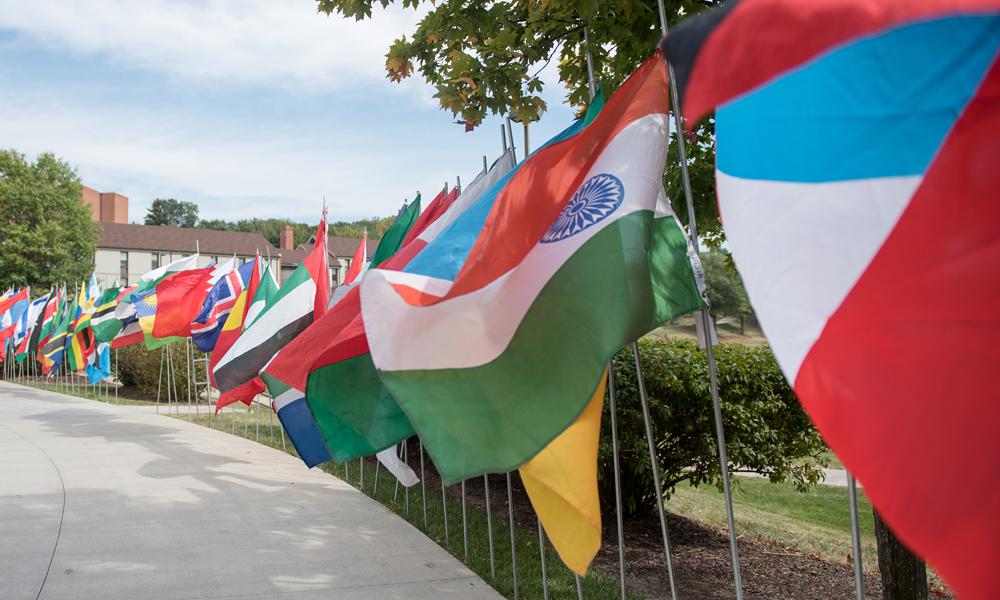Engaging the world
JMU’s presence on the global stage began 40 years ago with Semester in London
Education
SUMMARY: JMU's formal entry into the world of international education began in 1979 and has led to more university programs, strong partnerships and broad study opportunities for students.
A student’s challenge, a president’s directive and a young professor’s enthusiasm for teaching launched James Madison University into the world of international education 40 years ago this fall.
A little earlier, in Fall 1975, English professor Ralph Cohen was teaching a class on Shakespeare, and finding himself often saying to his students, “If you could only see it on stage, you would understand.”
“Why don’t you take us over to London?” one student asked. Challenge accepted. Cohen drew on travel experience from the wedding trip he and his wife, Judy, took to Europe and his dissertation topic on Ben Jonson’s use of London in his plays to organize hastily a two-week Shakespeare tour during winter break open to JMU students from any academic department. In an article in The Breeze, Cohen touted the purpose as to “give students a strong sense of familiarity with the most literary and historic city in the English-speaking world.”
A May Session course in London followed in 1977, and based on student responses to both trips, JMU President Ronald E. Carrier instructed Cohen to prepare a feasibility report on establishing a semester-long program. Cohen sought advice from a colleague who designed St. Lawrence University’s early study-abroad program, but he crafted a hybrid plan for JMU. Its hallmarks were housing students together in the Bloomsbury area rather than living with host families, and, to keep a strong JMU connection, having a university faculty member in residence join British academics as a member of the teaching team.
With Carrier’s blessing and Cohen serving as the first FMIR, Semester in London was born when 28 “pioneers” took the purple and gold across the Atlantic.
The students lived “right in the heartbeat of London,” Cohen said, taking in 24 theater performances, the British Museum’s collections and untold numbers of walking study trips as British faculty members Cohen had hired taught art, architecture, theater, music, political science and history. Weekends were made for more study in Bath and Stratford.
“It was as rigorously fun as it was rigorously academic,” Ralph said of Fall 1979.
As Ralph’s unpaid program assistant, Judy handled myriad details, welcomed the students to the FMIR flat for meals and social events, and cared for their three daughters while her husband taught in the heart of London.
In the next two decades, Cohen was FMIR in London for four more semesters.

In 1989, Amy Cohen wanted to enroll in “her father’s” London semester to fulfill requirements for her undergraduate degree at Yale University. When Yale denied the request, Brian Allen, director of The Paul Mellon Centre for Studies in British Art, who was well-acquainted with the JMU program, suggested that Cohen send a copy of the JMU course syllabus to Yale officials. “Amy got the credit for every course because we had such a demanding syllabus that Yale could not say ‘no’ to our program,” Ralph said.
“The model Ralph created became the model for all of our semester-long programs,” said Lee Sternberger, executive director of JMU’s Center for Global Engagement and associate provost for academic affairs. “In many ways, I think of Ralph as the founder of international education at JMU.”
During his decade-long tenure as director of study abroad, Ralph collaborated with JMU faculty members Kathleen Arthur, Carmenza Kline and David Ley to establish semester programs in Florence, Italy; Salamanca, Spain; and Paris.
Judy officially joined JMU’s international education operation in 1989, the same year her husband resigned as director of Study Abroad. She is now director of communications and external relations for CGE. Ralph, a JMU professor emeritus of English, is co-founder of the American Shakespeare Center and the Gonder Professor of Shakespeare at Mary Baldwin University, both in Staunton, Virginia.
JMU remains a national leader in study abroad with semester programs in Antwerp, Belgium; St. Andrews and Edinburgh, Scotland; Florence; Salamanca; and London. More than 60 summer short-term programs, including Paris, and collaborations with 19 exchange partners combine with semester programs to offer a wide array of study-abroad options.

Study Abroad is now one of CGE’s three units, along with International Student and Scholar Services and International Cooperation. As a whole, the center promotes understanding by cultivating, facilitating and supporting global engagement at home and abroad.
Sternberger’s early charge as leader of CGE was to grow the numbers of JMU students and faculty going abroad and international students and faculty coming to campus. “We’ve matured as an office,” Sternberger said. During the last five years, the aim is for strategic growth. That translates to JMU’s becoming an official partner university of the Peace Corps Prep program, which prepares undergraduates for Peace Corps service and international development fieldwork, and cross-cultural programs in which international partners come to JMU.
Even the center’s space in Madison Hall is part of the equation. “Space gives you opportunity,” Sternberger said, and that has been leveraged in CGE’s larger meeting spaces, including a kitchen where students often come together to cook foods from their respective countries. For JMU students who do not study abroad, those encounters are especially valuable.
“They still experience some internationalization by interacting with students from other countries,” Sternberger said. “Our international students want to experience American traditions as well,” including Thanksgiving meals, pumpkin carvings and summer picnics.
“There are so many benefits to students having international experiences, whether that’s study abroad, working closely, having friendships with international students or even activities on campus,” Sternberger said. “They learn about the world through their interactions with other people.”

That growth and understanding pays off in tangible ways beyond the college years. “Employers want people who have international experiences,” Sternberger said. “They want people who can work on complex teams.”
The same is true of JMU as an employer. “If you want to internationalize a community, a university, it’s the faculty who drive internationalization,” Sternberger said.
Ralph Cohen concurs. “Students who participate in international education come back and share their experiences for one or two years, but faculty members infuse the campus DNA for decades,” he said. Their experiences inform their teaching and connect them with colleagues in other countries for the benefit of JMU.
“The world has shrunk tremendously, and in the face of so much misinformation and political forces that sometimes seem a bit dark … there’s this sense in many countries of shutting the doors to ideas, thought processes, systems, religious beliefs, cultural practices,” Sternberger said. “More than ever, we need to combat that. There’s so much to be gained by students. It’s not just what they learn; it’s international competence that they’re gaining.”
# # #

